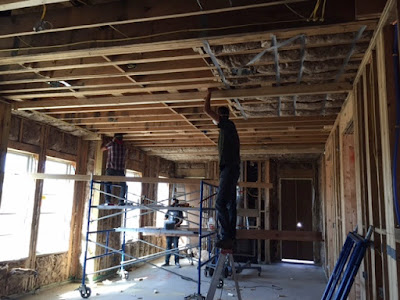Location Location Location!
The first rule of real estate is a doozie. If you love your home, and can't imagine getting old(er) in another one, you may want to visit the idea of remodeling or demo'ing. Channeling my inner nerd to give you an unbiased assessment in the form of a pro con list:
REMODELING YOUR HOME:
Pros:
- Lazy factor. You don't have to move ALL your stuff. Just most of it in strategic areas.
- Ease of change. Your home is still your home, just with some improvements. It is refreshing, or should be!
- Pocketbook friendly. In general, remodeling specific rooms of a home is less expensive than building an entirely new one.
- Fewer days. Time is saved by not starting anew. You'll probably still need to acquire permits from a building official if it is a significant alteration, possibly community/municipality approval as well.
Cons:
- Open up a can of worms! If your house was built before the internet, you may be opening up the walls to rotted insulation, corroded wires, that dirty word "mold"... remodeling is not for the faint of heart. What started off as a simple make-the-onebutt-kitchen-into-twoandahalfbutts may turn into a complete re-wiring, re-insulating, and de-humidifying chore. This would make the cost jump dramatically, these priorly unforeseen issues can wreak havoc on your savings.*
- You live in a construction zone. Depending on the scope of the project, bathrooms or kitchens are inaccessible, entire rooms or floors are open to the elements, and a roof replacement could open you up to Miss Unpredictable: mother nature.
- No kids/pets allowed. Four-legged and two-legged children need to be elsewhere during a remodel. Too many things to step in - or eat.
- And you may want to make sure all of the "unmentionables" are put away. You'll have a construction crew there that will be all over your home, and your days of the week underwear from your Mom are probably best left in your drawer.
* This is actually a pro in the long run. If you have mold or shoddy wiring in your home, the sooner you find out about it the better. It's just an expensive discovery that you need to prepare yourselves for if you are in an older home.
| Your new remodeling housemates! Photo Credit: Kurk Homes |
DEMOLITION OF EXISTING HOUSE & BUILDING A NEW HOME:
Pros:
- Still your favorite location! School drop off, work commute, that shady bar that you love.. still at the same distance. No relearning "scenic" shortcuts!
- New home, starting fresh. When you demo the older home, you take with it all of the issues within the structure as well as the flow. Now you can make that open floor plan without having to add a million lam beams. Seriously, lam beams are more expensive than you would think!
- With new IRC codes and energy efficiency standards, new homes will be more efficient. So you'll save on those monthly energy bills - unless of course, you were living off the grid beforehand.
Cons:
- Permits can be a bit process to obtain. City permits may take upwards of 6 weeks. You'll need approval from all the governing jurisdictions for utility shut-off and transfer, temporary to permanent power, moving water and wastewater lines, etc. Some cities also require you to use only their approved contractors, which may or may not be better than your builder's approved contractors. This can be a headache and a delay - but many contractors help you obtain the necessary permits. Chances are, they've done this a time or two and know the process.
- Time. Design time, demo time, build time, and two moves. Demo'ing and building a new home takes a significant amount of calendar days. Do you have the time and the place to move for the 6 months (in a perfect world) to 18 months or longer if the weather misbehaves?
- Cost. Another significant investment is in your bank account. Can you afford to demo the old house and build fresh? A remodeling job can range from less than $20,000 to over $200,000 but a demo/rebuild is going to start around that $150,000 and increase from there depending on square footage and amenities.
SO WHAT NOW?
Get assistance from builders and contractors to evaluate your options within your overall investment. You should be able to decide whether you want to demo or remodel first, that will keep your list of contractors to vet down since some builders don't remodel and vice versa.
Talk to your trusted contractors and get an inspection to uncover some of the mysteries behind the walls.
Check out your governing jurisdictions for permits - think of your deed restrictions, current survey of your home and property, utility easements, driveway easements, architectural control committees, etc. Everyone just might have an opinion, and an approval process to follow.
That at least will give you a headstart in the process!









